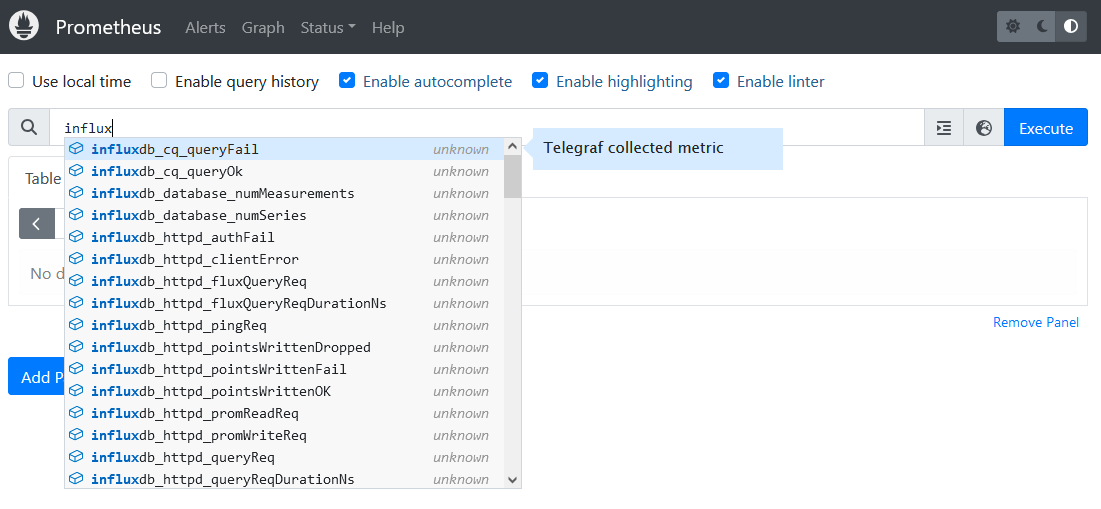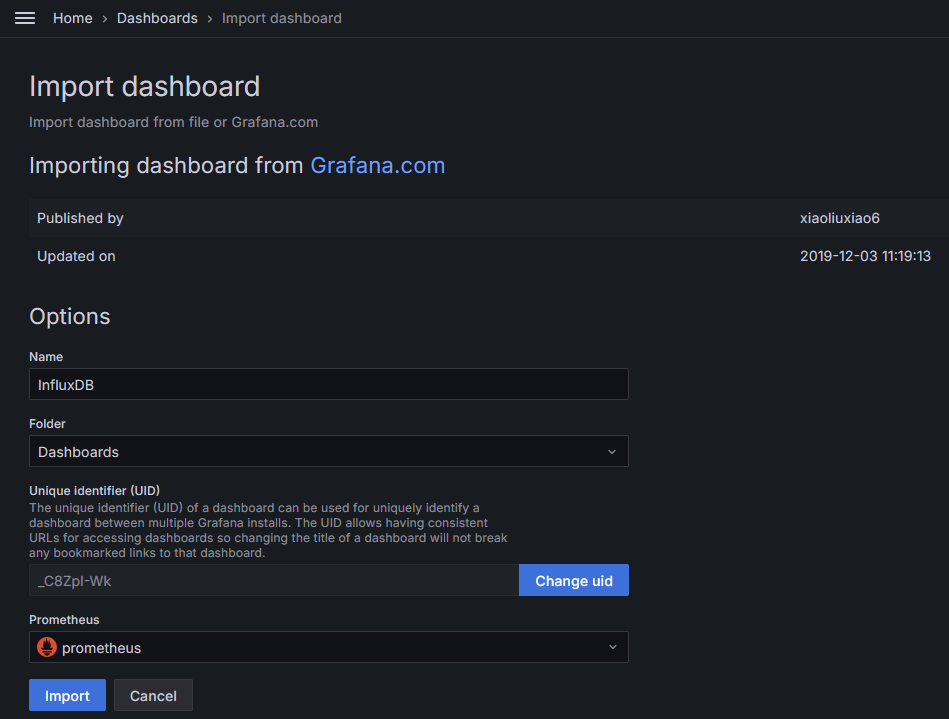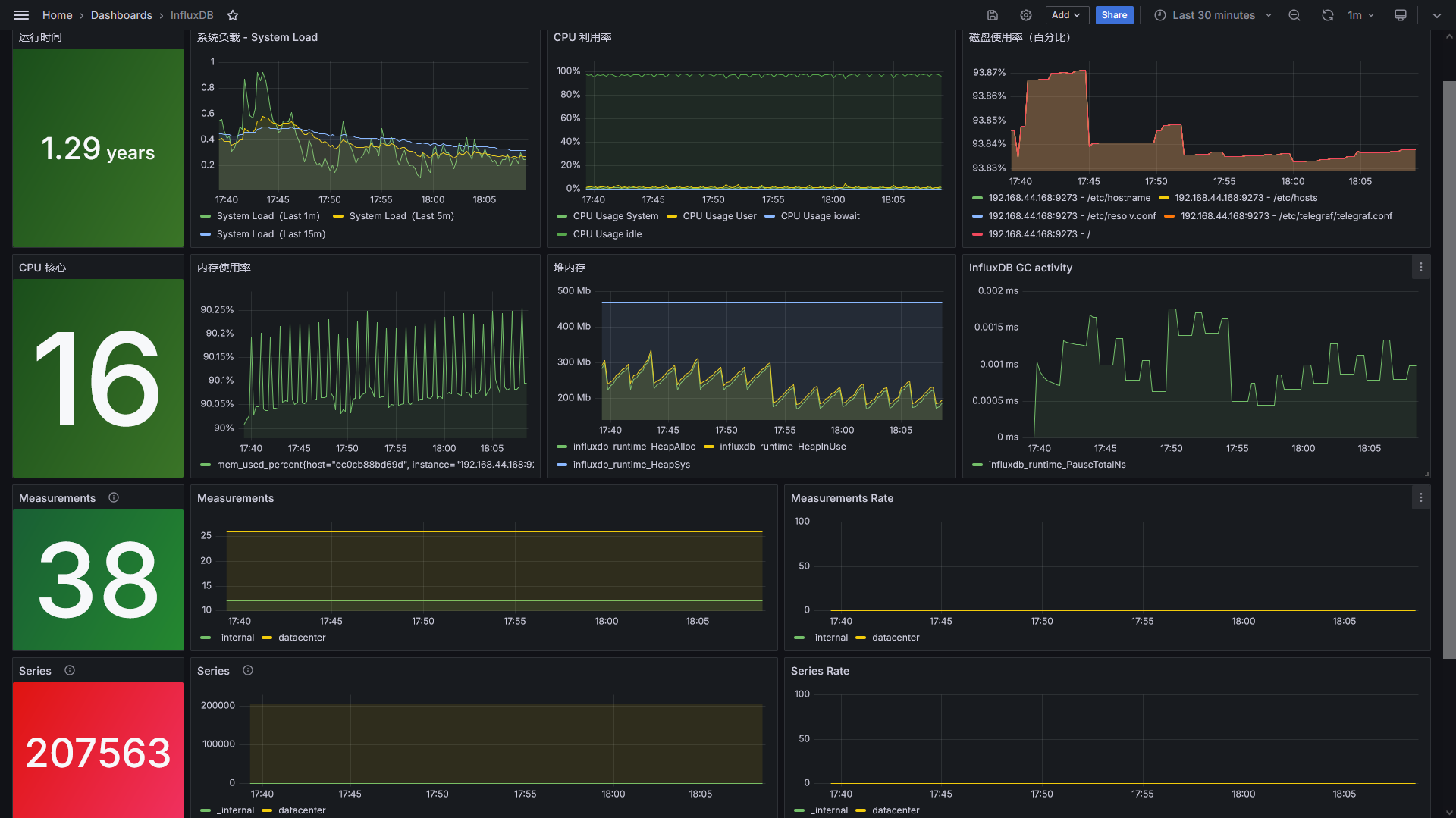背景
如果你要为应用程序构建规范或用户故事,那么务必先把应用程序每个组件的监控指标考虑进来,千万不要等到项目结束或部署之前再做这件事情。------《Prometheus监控实战》
去年写了一篇在Docker环境下部署若依微服务ruoyi-cloud项目的文章,当时使用的是 docker-compose 在单台机器上部署若依微服务 ruoyi-cloud 项目;在这个基础上,作为演示项目,我们计划实现对所有基础组件和微服务的监控。之前记录了搭建 Prometheus 与 Grafana 监控系统的过程。今天这篇文章主要是记录下对 InfluxDB 的监测,用到的 exporter 是: Telegraf , Telegraf 是一个开源的、插件驱动的服务器代理,用于收集、处理、和发送各种性能数据。它是 InfluxData 的一部分,常用于与 InfluxDB 结合使用,但也支持输出到其他存储系统,如 Prometheus 、 Graphite 、 OpenTSDB 、 ElasticSearch 等。。
虚机资源
共用到了2台虚机,1台作为应用服务节点,1台运维监控节点。
| 主机名 | IP | 说明 |
|---|---|---|
| svc | 192.168.44.168 | 服务节点 |
| ops | 192.168.44.169 | 监控节点 |
基本选用当前最新版本,即将安装的 Prometheus 和 Grafana 及组件版本信息如下:
- Prometheus版本:v2.54.1
- Grafana版本:11.2.0
- Telegraf版本:1.19.3
系统环境
bash
[root@ops ~]# uname -a
Linux ops 5.10.0-182.0.0.95.oe2203sp3.x86_64 #1 SMP Sat Dec 30 13:10:36 CST 2023 x86_64 x86_64 x86_64 GNU/Linux
[root@ops ~]# cat /proc/version
Linux version 5.10.0-182.0.0.95.oe2203sp3.x86_64 (root@dc-64g.compass-ci) (gcc_old (GCC) 10.3.1, GNU ld (GNU Binutils) 2.37) #1 SMP Sat Dec 30 13:10:36 CST 2023ops节点:docker-compose安装Prometheus与Grafana
参考云原生之运维监控实践-OpenEuler22.03SP3上安装Prometheus与Grafana实现主机状态监测
svc节点:docker-compose安装Telegraf
有了 Prometheus 与 Grafana 的基础环境,我们来实现对 InfluxDB 状态的监控:通过 Telegraf 快速采集 InfluxDB 运行数据并以 Prometheus 格式提供,供 Prometheus 进行采集和分析。
Telegraf 是一个高效且灵活的指标收集代理,它支持从多种来源收集数据并将其转发到多个输出目标。无论是服务器监控、应用性能监控,还是云服务、容器和网络设备的监控, Telegraf 都能够满足需求,并且具有极低的性能开销。通过其插件架构, Telegraf 提供了很高的可扩展性和灵活性,非常适合用于现代的监控和 Observability 系统中。
安装Telegraf
在需要监测的主机上,编辑 docker-compose.yml 文件,增加安装 Telegraf 配置。
-
root@svc monitoring\]# vi docker-compose.yml
version: '3'
services:
ops-telegraf:
image: telegraf:1.19.3
container_name: ops-telegraf
restart: unless-stopped
ports:
- "9273:9273"
volumes:
- "./telegraf/conf/telegraf.conf:/etc/telegraf/telegraf.conf"
* telegraf.conf
通过 `http://192.168.44.168:8086/debug/vars` 获取 `InfluxDB` 的基础信息,并配置了用户认证信息。此外,还添加了关于CPU、内存、磁盘、IO等系统参数抓取配置。
```conf
[[outputs.prometheus_client]]
listen = ":9273"
[[inputs.influxdb]]
urls = [
"http://192.168.44.168:8086/debug/vars"
]
username = "admin"
password = "you-guess"
[[inputs.cpu]]
## Whether to report per-cpu stats or not
percpu = true
## Whether to report total system cpu stats or not
totalcpu = true
## If true, collect raw CPU time metrics.
collect_cpu_time = false
# Read metrics about disk usage by mount point
[[inputs.disk]]
## By default, telegraf gather stats for all mountpoints.
## Setting mountpoints will restrict the stats to the specified mountpoints.
# mount_points = ["/"]
## Ignore some mountpoints by filesystem type. For example (dev)tmpfs (usually
## present on /run, /var/run, /dev/shm or /dev).
ignore_fs = ["tmpfs", "devtmpfs"]
# Read metrics about disk IO by device
[[inputs.diskio]]
## By default, telegraf will gather stats for all devices including
## disk partitions.
## Setting devices will restrict the stats to the specified devices.
# devices = ["sda", "sdb"]
## Uncomment the following line if you need disk serial numbers.
# skip_serial_number = false
[[inputs.mem]]
[[inputs.swap]]
[[inputs.processes]]
[[inputs.kernel]]
[[inputs.system]]通过命令: docker-compose up -d 完成镜像拉取、并启动 ops-telegraf 服务。
修改Prometheus配置
在 Prometheus 配置中增加对svc主机上 InfluxDB 运行状态的抓取配置。
-
root@ops monitoring\]# vi ./prometheus/conf/prometheus.yml
scrape_configs:
- job_name: 'ops-telegraf'
scrape_interval: 15s
static_configs:- targets:
- 192.168.44.168:9273
- targets:
重启 `Prometheus` 容器。
```bash
[root@ops monitoring]# docker restart ops-prometheus验证telegraf安装结果
- 浏览器验证metrics端点
浏览器访问http://192.168.44.168:9273/metrics
- Prometheus控制台验证influx相关的指标

配置Grafana对主机状态的可视化
浏览器访问http://192.168.44.169:3000。
- 配置数据源
- 点击左侧菜单中的"Add new connection"。
- 选择或搜索"Data Sources"。
- 点击"Add data source"并选择"Prometheus"。
- 在"HTTP"部分输入Prometheus地址,eg:http://192.168.44.169:9090
- 点击"Save & Test"确认连接成功。
- 查看现成的仪表板
https://grafana.com/grafana/dashboards/这个页面是 Grafana 的官方仪表板目录,用户可以在这里找到和共享各种现成的 Grafana 仪表板。这些仪表板覆盖了多种监控需求,包括系统性能、应用监控、网络流量等。用户可以根据自己的需求搜索和导入适合的仪表板,提高监控效率和可视化效果。这里我们搜索 Influx ,结果中有个 InfluxDB ,点击进去可以查看详细的UI效果,复制仪表板的id,此处是11334。
- 导入现成的仪表板
- 在右侧菜单中点击"New"按钮,然后选择"Import"。
- 在输入框中,可以直接输入现成仪表板的ID,或者上传JSON文件。常用的主机监控仪表板ID是11334(InfluxDB)。
- 点击"Load",随后选择已配置好的数据源。
- 点击"Import"完成导入。

InfluxDB监控效果

小总结
If you can't measure it, you can't improve it!
没有度量就没有改进,实际上,监控系统有以下两个客户 :技术,业务。上述内容即是对技术组件的监控,方便技术方面的改进与优化。
本文记录了在 Docker 环境下通过 Prometheus 和 Grafana 实现对 InfluxDB 服务的监控。具体步骤包括在服务节点上使用 docker-compose 安装 telegraf ,配置 Prometheus 抓取 InfluxDB 的监控数据,并在 Grafana 中配置数据源和导入现成的监控仪表板,以实现对时序数据库服务的性能监控和可视化。
Reference
If you have any questions or any bugs are found, please feel free to contact me.
Your comments and suggestions are welcome!